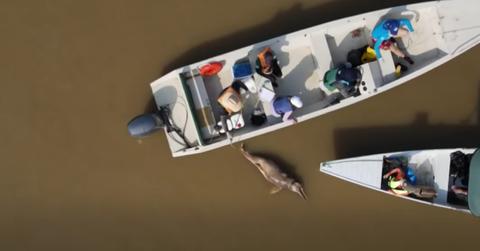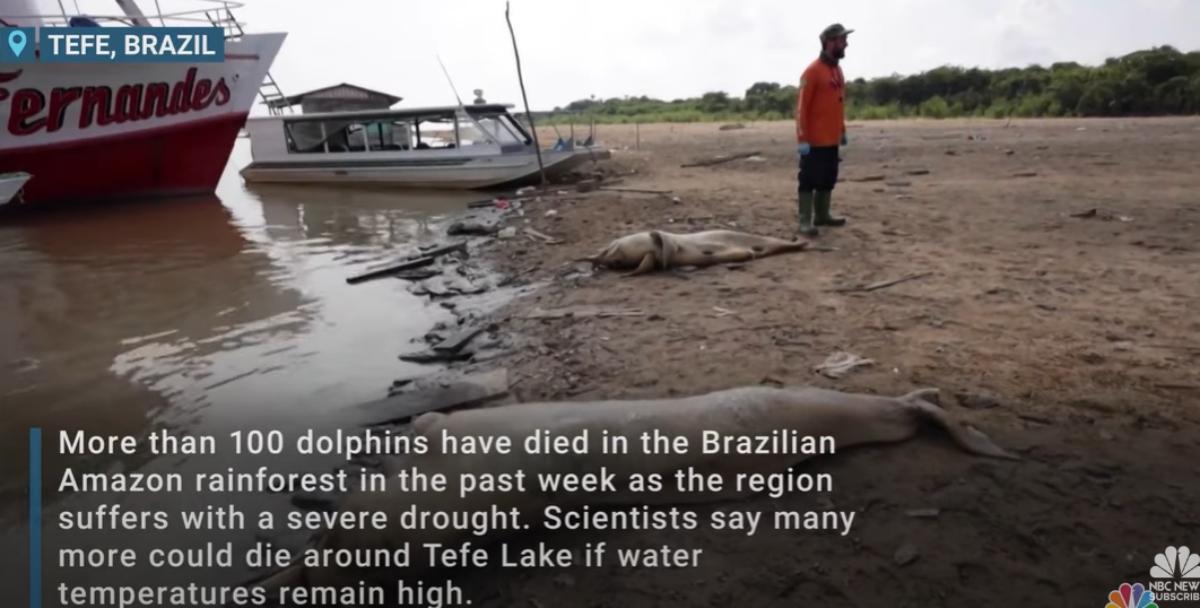Over 100 Dolphins Found Dead in Amazon Due to Climate Change
Published Oct. 4 2023, 3:42 p.m. ET

Boats work to retrieve a dolphin carcass in the Amazon River in Brazil.
The deaths of over 100 dolphins in a part of the Amazon River in Brazil took place in September 2023, providing a solemn reminder of how devastating climate change is to wildlife. Experts say the most likely cause of the large number of deaths is high water temperatures and drought, according to Reuters.
In addition to more than 120 river dolphin carcasses being found floating in a tributary of the Amazon River, thousands of fish have been reported dead in the same region due to lack of oxygen in the water. Here are all the details about the sad loss of these dolphins and what marine and environmental experts are saying.

Dead dolphins are washing up and being recovered from the Amazon.
Dolphins and fish were found dead in the Brazilian Amazon rainforest.
Miriam Marmontel, a researcher at Brazil's Mamirauá Institute, told Reuters in early October 2023 that her team had "documented 120 carcasses in the last week."
About eight out of 10 of the dead dolphins have been the Amazon's pink river dolphins, which are a unique freshwater species that only lives in South American rivers.
Marmontel told AP News that about 1,400 river dolphins previously were living in Tefe Lake. Since about 120 dolphin carcasses have been recovered, she said that might mean a 5 percent to 10 percent loss of this species population in only about a week.
Climate change, extreme temperatures, and drought are to blame for these mass dolphin deaths.
Teams of veterinarians and aquatic mammal experts are investigating the dolphin deaths. According to Reuters, two major effects of climate change — drought and heat — are likely the cause of these 120 dolphin deaths.
Severe drought in the Amazon rainforest has caused very low water levels in the river, and the low river levels causes the water temperature to rise to where dolphins cannot survive in it. 70 or more of the dolphin carcasses surfaced when the lake was 102 degrees Fahrenheit.
Researcher Ayan Fleischmann, also of the Mamirauá Institute, told AP News that high temperature was believed to be the main cause of the dolphins' deaths. Water temperatures, he said, rose from 32 degrees Celsius (about 90 degrees Fahrenheit) to almost 38 degrees Celsius (about 100 degrees Fahrenheit) on the first day of October.

In happier times, a Tucuxi river dolphin swims in the Amazon near Mamiraua Sustainable Development Reserve in Brazil.
However, although experts are cautiously stating that drought and high water temperatures are to blame, that isn't a certain conclusion. Reuters reported that scientists are looking into whether a bacterial infection might have been the culprit, killing the marine mammals in a lake that flows into the Amazon river. In addition, El Niño could also play a role in causing the Amazon drought.
If you're wondering about the fate of the remaining dolphins in this part of the Amazon River, Reuters said that the Chico Mendes Institute for Biodiversity Conservation has "rushed veterinarians and aquatic mammal experts to rescue dolphins that are still alive in the lake." However, until researchers can determine that the dolphins did not die from a bacterial infection, it's not possible to move them into cooler parts of the river.